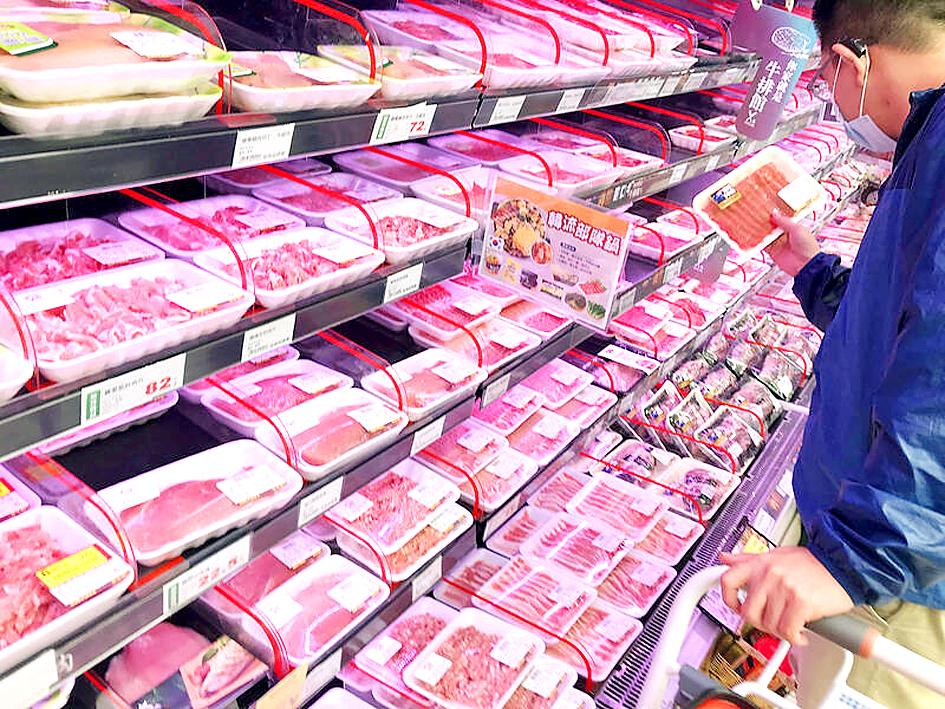The preferential tariffs and taxes on critical commodities sold in Taiwan have been extended from the end of this month to March next year, the Executive Yuan said yesterday, citing a need to stabilize inflation.
The preferential tariffs cover soybean, wheat and corn imports, which are exempted from sales taxes, while imported wheat, butter and milk powder used for baking are tariff-free, and frozen beef has a 50 percent reduction on tariffs, it said.

Photo: CNA
The extension also means that the NT$2 per liter reduction on the commodity tax on gasoline would remain in place, as well as the NT$1.5 per liter reduction on the commodity levy on diesel, and the 50 percent cut in the tax on Portland cement, it added.
The decision marked the 16th round of preferential tariffs or taxes implemented since 2021 to stabilize domestic inflation.
Although the prices of some items, such as agricultural and industrial raw materials, have stabilized and returned to the same levels as at the end of 2021, the prices of some other products, including butter and frozen beef, have remained high, the Executive Yuan said.
Given the risk of inflation, the preferential tariffs and taxes have been extended to March next year to boost consumer purchasing power and lower the business sector’s operating costs, it said.
The Ministry of Economic Affairs has been asked to continue to negotiate with business associations and individual companies to adjust product prices in response to the latest round of preferential tariffs and taxes to allow consumers to benefit from the government’s policy, it added.
Meanwhile, the Department of Consumer Protection has been checking the prices of moon cakes at the four largest convenience store chains in Taiwan, the four major hypermarket and supermarket chains, and the five top online shopping sites ahead of the Mid-Autumn Festival holiday, when such products are usually in high demand, the Executive Yuan said.
The checks found that the prices of 53.8 percent of moon cakes are the same or a bit lower than last year, while 46.2 percent are more expensive, but the hike has been under 10 percent, it said.
In addition, a consumer price inspection task force is to carry out random checks to monitor the prices of meat and other food items ahead of other upcoming national holidays such as Double Ten National Day on Oct. 10 and Taiwan Restoration Day on Oct. 25, it added.

RUN IT BACK: A succesful first project working with hyperscalers to design chips encouraged MediaTek to start a second project, aiming to hit stride in 2028 MediaTek Inc (聯發科), the world’s biggest smartphone chip supplier, yesterday said it is engaging a second hyperscaler to help design artificial intelligence (AI) accelerators used in data centers following a similar project expected to generate revenue streams soon. The first AI accelerator project is to bring in US$1 billion revenue next year and several billion US dollars more in 2027, MediaTek chief executive officer Rick Tsai (蔡力行) told a virtual investor conference yesterday. The second AI accelerator project is expected to contribute to revenue beginning in 2028, Tsai said. MediaTek yesterday raised its revenue forecast for the global AI accelerator used

TEMPORARY TRUCE: China has made concessions to ease rare earth trade controls, among others, while Washington holds fire on a 100% tariff on all Chinese goods China is effectively suspending implementation of additional export controls on rare earth metals and terminating investigations targeting US companies in the semiconductor supply chain, the White House announced. The White House on Saturday issued a fact sheet outlining some details of the trade pact agreed to earlier in the week by US President Donald Trump and Chinese President Xi Jinping (習近平) that aimed to ease tensions between the world’s two largest economies. Under the deal, China is to issue general licenses valid for exports of rare earths, gallium, germanium, antimony and graphite “for the benefit of US end users and their suppliers

Dutch chipmaker Nexperia BV’s China unit yesterday said that it had established sufficient inventories of finished goods and works-in-progress, and that its supply chain remained secure and stable after its parent halted wafer supplies. The Dutch company suspended supplies of wafers to its Chinese assembly plant a week ago, calling it “a direct consequence of the local management’s recent failure to comply with the agreed contractual payment terms,” Reuters reported on Friday last week. Its China unit called Nexperia’s suspension “unilateral” and “extremely irresponsible,” adding that the Dutch parent’s claim about contractual payment was “misleading and highly deceptive,” according to a statement

Artificial intelligence (AI) giant Nvidia Corp’s most advanced chips would be reserved for US companies and kept out of China and other countries, US President Donald Trump said. During an interview that aired on Sunday on CBS’ 60 Minutes program and in comments to reporters aboard Air Force One, Trump said only US customers should have access to the top-end Blackwell chips offered by Nvidia, the world’s most valuable company by market capitalization. “The most advanced, we will not let anybody have them other than the United States,” he told CBS, echoing remarks made earlier to reporters as he returned to Washington